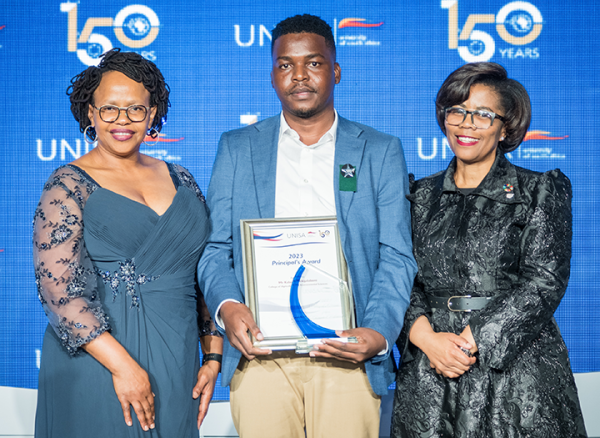College of Agriculture & Environmental Sciences
In pursuit of using natural medicine to treat disease
While treatments exist to manage cardiometabolic diseases, such as diabetes, and chronic conditions, such as HIV, they are often unaffordable for some and cause adverse side effects in others. This issue is worse in rural areas and less privileged communities where access to healthcare is limited. Additionally, some individuals choose not to take pharmacological drugs due to their personal beliefs.

Kabelo Mokgalaboni
"Coming from a rural village in Ga-Kuranta, Bolobedu, I have witnessed many people struggling with such conditions," says Kabelo Mokgalaboni, a member of a multidisciplinary research team that conducts physiology and phytochemistry (a branch of chemistry concerned with plants and their extracts) research at Unisa. "This motivated me to focus my research on herbal/natural medicine that uses plants and traditional vegetables that are freely available in rural areas due to their proven efficacy."
A young scholar in pursuit of research excellence, Mokgalaboni is currently involved in two major research projects with his postgraduate students, both internally and externally. One project examines the effects of antiretroviral therapy on endothelial function and liver functions in HIV patients. The other project explores the effects of natural herbs and plants in animal models of diabetes.
The latter project is part of his PhD research, which investigates the dual treatment effects of plant extracts in animal models of diabetes, focusing on safety, toxicity and impacts on cardiometabolic parameters.
Engaged scholarship for academic and societal impact
It is important for researchers to conduct research that benefits society. "If numbers are something to rely on, says Mokgalaboni, my citation h-index of 14 across various research databases indicates that my work has had a positive impact."
To attest to this, are the recent studies Mokgalaboni conducted on curcumin and okra in diabetes mellitus, which have been cited over 56 and 9 times, respectively, by other researchers.
Beyond the citation index, he has presented his findings on various platforms, including the University of Limpopo Research Day, the Unisa postgraduate symposium, the South African Medical Research Council, and at an online international conference hosted in Orlando in the United States.
"These presentations," he explains, "have allowed me to engage with diverse audiences about the benefits of plant extracts, herbs and supplements to manage hyperglycaemia in both prediabetic and type 2 diabetes patients. The key takeaway from these engagements has been the recognition that safe and effective alternative medicines are available."
Mokgalaboni has published 39 research articles in accredited journals, many of which are classified in the first quartile. Recently, his team provided evidence that natural plants, particularly okra, have fewer side effects and offer sugar-lowering benefits for patients with prediabetes and type two diabetes mellitus.
This is particularly significant for rural and disadvantaged diabetic populations who may not be able to afford conventional medications, as these plants can be grown in home gardens and used as dietary supplements.
Di retwa di boa mokatong ─ Good deeds are rewarded
Mokgalaboni’s upward trend of excellence in research has garnered him sought-after academic awards.
"A major highlight was receiving the 2023 South African National Research Foundation award, which recognised my contribution to research excellence as a young academic," he says.
In June this year (2024), Mokgalaboni was recognised with the second highest award for research at Unisa, the Principal’s Award.
Commenting on the significance of the award, he says: "I am thrilled and honoured to have shaken hands with the Principal and Vice-Chancellor, Professor Puleng LenkaBula, and the Vice-Principal of Research, Postgraduate Studies, Innovation and Commercialisation, Professor Thenjiwe Meyiwa. As this marks my third year at Unisa, this award especially signifies a milestone in my academic and professional journey. In Sepedi, we say di retwa di boa mokatong, which means good deeds are rewarded."

Kabelo Mokgalaboni with Unisa Principal and Vice-Chancellor, Prof Puleng LenkaBula, and Vice-Principal: Research, Postgraduate Studies, Innovation and Commercialisation, Prof Thenjiwe Meyiwa
Mokgalaboni says the award reflects not only his efforts but also the collaborative effort of the academic community at Unisa. "It acknowledges the support I have received from my supervisors, mentors, colleagues and collaborators, my physiology postgraduate students, and the research office, all of whom have continually encouraged me to strive for excellence."
A message for young scholars
An esteemed lecturer in Human Physiology and Anatomy in the Department of Life and Consumer Sciences in the College of Agriculture and Environmental Sciences, Mokgalaboni’s academic journey started at the University of Limpopo.
He obtained a Bachelor of Medical Sciences, majoring in haematology (honours) at the University of Limpopo, with distinction in 2016. He went on to pursue a master's degree in medical sciences, specialising in human physiology, at the University of KwaZulu-Natal, which he completed in 2020. He is currently pursuing a PhD in Life Sciences at Unisa.
Believing that students learn best from their peers, and as a young academic, he aims to inspire his students and other young scholars to excel in research. "My advice centres on dedication, curiosity and perseverance, which have been key to my academic achievement," he reflects.
Mokgalaboni says it is also important for young scholars to recognise the importance of collaboration, especially with seasoned researchers.
In conclusion, he says that the academic community thrives on the exchange of ideas, so as a young scholar, one needs to find academic mentors and collaborate with other scholars. "My achievements demonstrate that you can accomplish far more than individual effort with teamwork. Most importantly, you must maintain academic integrity, honesty, and uphold ethics standards. Your reputation in the academic community depends on the trust and respect of your peers, so conducting your research with transparency is essential."
* By Mpho Moloele, PR and Communications, Department of Research, Innovation and Commercialisation
Publish date: 2024/09/29

 Unisa co-hosts G20 community outreach in the Eastern Cape
Unisa co-hosts G20 community outreach in the Eastern Cape
 Unisans gain membership of prestigious science academies
Unisans gain membership of prestigious science academies
 Advocating for disability transformation through servant leadership
Advocating for disability transformation through servant leadership
 Unisa Press continues to illuminate the publishing space
Unisa Press continues to illuminate the publishing space